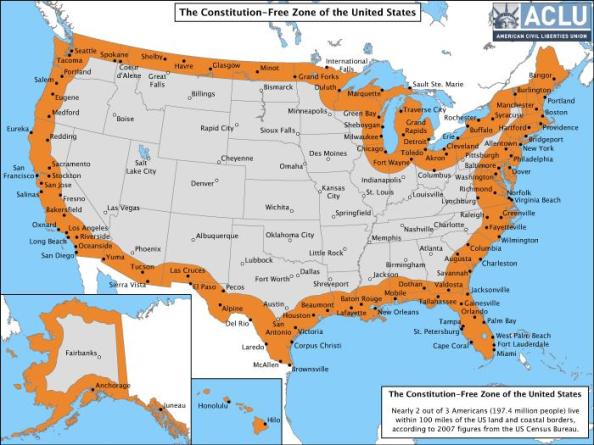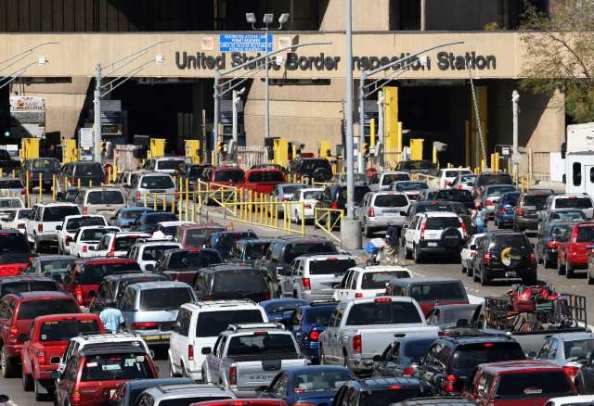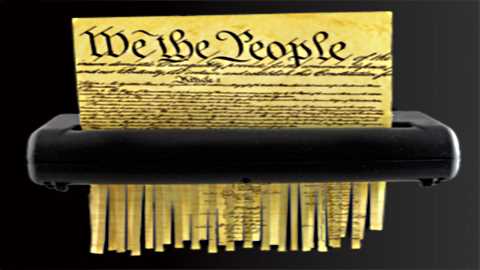Modern American politics is filled
with partisanship, legalized corruption and extremism. On this site you
will find articles on a variety of subjects and points of view that are
not normally portrayed in the corporate media–don’t expect any
sugar-coating, pandering or interest money propaganda here.
Two-Thirds of Americans Live in the 4th Amendment “Exemption Zone”
Posted on January 6, 2014
© Josh Sager – January 2014
The Abidor et al v. Napolitano et al case, which Judge Korman just dismissed in favor of the government, focused upon warrantless searches of laptops without suspicion at the border. In this case, an American student was stopped at the border after traveling to several Middle Eastern countries and was forced to unlock/surrender his laptop computer. Despite the fact that nothing illegal was found on the computer, it still took nearly two weeks for Abidor to recover his laptop (which held the only copy of his thesis paper).
While dismissing this case, Judge Korman conceded to the government’s assertion that there is a 100 miles zone inland from every international border where federal authorities to have the ability to search and seize digital devices without warrant or cause—his only caveat to this concession was that “if suspicionless forensic computer searches at the border threaten to become the norm, then some threshold showing of reasonable suspicion should be required.”
In short, if you live in or are traveling through the orange-shaded portion of this map, it would be legal for federal authorities to stop you, force you to give them the password for your laptop, and seize your files—no warrant would be needed and there would be no certainty that you would ever recover your files or your digital devices.
Due to the geography of the United States, the 100-mile exemption zone for searches has the potential to circumvent the 4th Amendment protections for a significant majority of the American people In addition to the fact that many major population centers lie within 100 miles of the coast, several states are entirely covered by this zone (ex. Florida, Maine, Vermont, and Connecticut).
The Border Exemption
Federal authorities have the ability to search people who wish to enter the United States—this authority is written into federal law and has been confirmed by the Supreme Court.
Under the provisions of federal law which outline the powers of border officials (8 USC § 1357),
federal agents have the power to perform warrantless searches within a
“reasonable distance” of the US border. The term “reasonable distance”
is defined under Attorney General’s regulation 8 CFR § 287.1 as “within 100 air miles from any external boundary of the United States.”
Several Supreme Court cases (ex. Almeida-Sanchez v. US and US v. Montoya De Hernandez) have upheld this “border exemption” to the 4th Amendment as a function of national sovereignty. In 1979, the Supreme Court decision Torres v. Puerto Rico included a succinct explanation of the justification for the border exemption:“The authority of the United States to search the baggage of arriving international travelers is based on its inherent sovereign authority to protect its territorial integrity. By reason of that authority, it is entitled to require that whoever seeks entry must establish the right to enter and to bring into the country whatever he may carry.”
In 2008, this exemption zone was expanded by the Supreme Court to include the search of digital devices in addition to physical baggage by the US v. Arnold ruling.
When past case law is
synthesized with current federal law, the result is the federal
government asserting the right to search the digital devices and
vehicles of any American within 100 miles of a border, without having to
get a warrant or show reasonable suspicion that the person in question
is committing a crime.
Conclusion
Judge Korman’s ruling in Abidor v. Napolitano et al is just the most recent manifestation of creep in the federal government’s ability to circumvent constitutional protections. By classifying entire states and cities as border zones, federal authorities are able to get around the 4th Amendment in a way that would likely horrify the authors of the Constitution—after all, at the time of this country’s founding, almost everybody lived along the coasts and this 100-mile “exemption zone.”The search and seizure powers that the government is asserting (and the courts are confirming) create the perfect situation for abuse. It is unlikely that large numbers of random people will have their digital devices seized by the government, but it is highly likely that this power will be used to target those who challenge the status quo.
Theoretically, the federal government could seize the digital devices and data of a reporter like Glenn Greenwald if he was visiting a coastal city like New York for a conference with other reporters or a meeting with sources. Federal agents could stop Greenwald in his hotel lobby, take his computer, and mine it for information on sources, contacts, and future stories. Because of the border exemption, neither the 4th Amendment protection from unreasonable searches and seizures, nor the 1st Amendment protections on the press would help Greenwald.
In addition to threatening journalist, these searches and seizures are a threat to political activists (ex. people protesting corruption), academics who have ideas that are not popular to those in power (ex. Professor Juan Cole during the War on Iraq) and even political candidates who threaten the already powerful (Joseph McCarthy would have loved these searches).
Unless the courts side with civil rights groups over the national security apparatus, we will wake up one day and face the fact that our constitutional protections are just words on a page that no longer have any real meaning. Today, the government may claim that the 4th Amendment must be circumvented in these zones for security and expedience, but what about tomorrow? If it is okay to curtail the 4th Amendment in these zones, then what is stopping the same argument being used to attack the 5th, 6th and 8th Amendments in these zones tomorrow?
Put simply, the assertion that entire cities and states are “exemption zones” for constitutional protections is nothing more than an end-run around the Constitution and something that no honest jurist should support or condone.




No comments:
Post a Comment